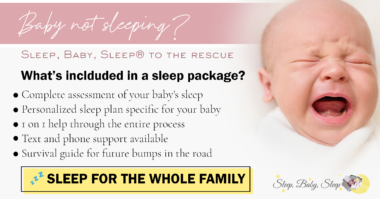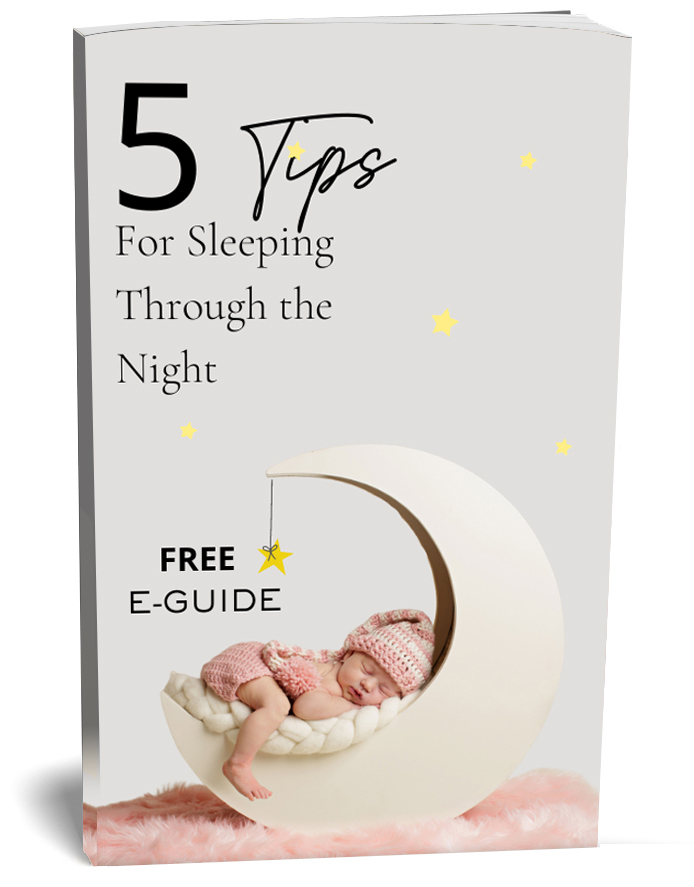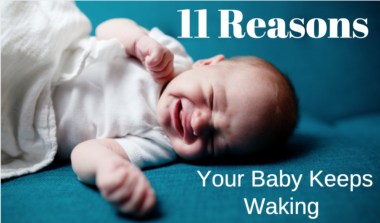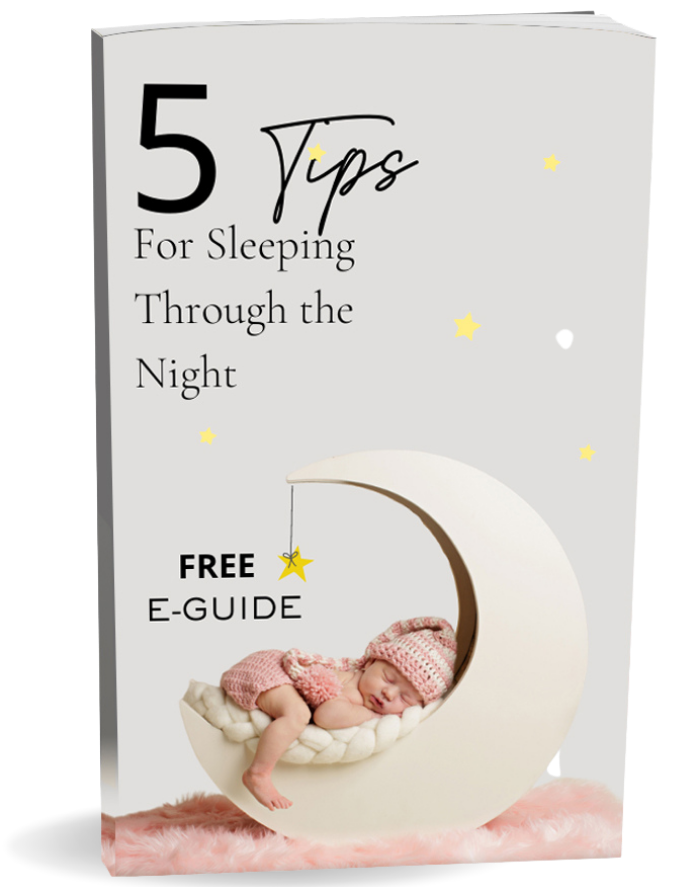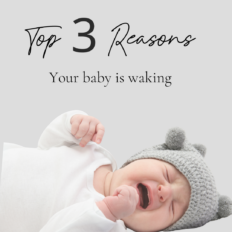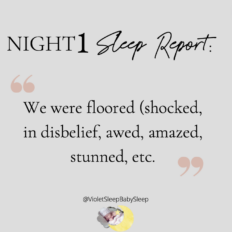11 Top Reasons Your Baby Won’t Sleep (And What to Do)
Does this sound like you? In the hospital, you couldn’t wake your new bundle of joy up long enough for an open-eyed first photo. Perhaps you even secretly gloated, “My mother was wrong! I got an ‘easy’ baby.”
Then you brought Baby home and somehow, well…she woke up. And I mean really woke up.
Now you just can’t seem to rock, feed, sing or beg and plead your baby to sleep, even when you desperately need some shut-eye. To make things worse, this seems to be happening more at night than during the day.
You think, “I’m doing everything I can possibly do; why won’t my baby sleep?”
I’m here to give you the scoop on the top 11 reasons your baby just won’t sleep. Plus, I’ll be letting you in on the secrets to solving each one.
Night Wakings Are a Common Problem
First of all, know that you’re not alone. In fact, a 2018 study from the American Academy of Pediatrics found that up to 57% of 6 to 12-month-olds don’t sleep through the night.
In fact, this issue is so common that many parents think it’s normal for their baby to wake frequently during nighttime hours. I’m here to tell you that it’s not. In this article, I’ll be letting you in on why you and your baby don’t have to suffer with sleepless nights.
I’ve pinpointed the 11 most common reasons infants won’t go to sleep when you want them to.
Here are the top reasons I’ve heard from hundreds of clients over the years (and experienced myself), and what to do about each.
#1: OVERUSE OF SLEEP PROPS
What it Is
A sleep prop can be any object, sound, motion, texture or even scent that is required to get oneself to sleep.
The most common sleep props for infants include:
- Bottle or breastfeeding/nursing to sleep
- Rocking to sleep
- Swinging to sleep
- Movement/vibration in a car seat or stroller
- Overuse of an oral pacifier
- Holding to sleep/sleeping on parent
Never heard of a sleep prop? Actually, you probably use at least one. I know we did.
One night, I was surprised to discover that my first baby, Brianna, was using her sheet to self-soothe. I noticed her rubbing her face side-to-side against the sheet until she fell asleep.
That’s when my medical training combined with simple observation kicked in: the feel of the sheets I was using, combined with the repetitive movements, had become a sleep prop for Brianna.
First, we swapped her bedding for some amazing velour sheets . Then I experimented and honed Gentle Sleep Training to eliminate all of the bad sleep habits I instilled. (Read my and Brianna’s full story here.)
What to Do
Don’t worry: while your baby needs to learn to sleep without these props, you can snuggle and play as much as you’d both like during wakeful hours Plus, did you know that the use of a pacifier has been connected to a reduced rate of SIDS? (Contact me to find out more!)
The problem with sleep props starts when you become overdependent upon them as tools to make your infant fall asleep.
An easy way to know whether your baby is over-reliant on bedtime props is if she wakes up crying hard or screaming. If she’s not sick or in pain, it’s likely that your baby has become dependent on sleep props.
To encourage good sleep habits, your baby should be laid down to sleep awake, without any props. This goes for bedtime and when she wakes during the night.
Laying your baby down without any props will help your baby learn to soothe herself, so that she is not so reliant on you to sleep well.
Important: any self-soothing method you use should be done with love and with safety as the priority. You want what’s best for your baby, but with well-meaning friends and relatives all giving you conflicting advice, you may need an expert to guide the way. Before getting started, contact me by clicking the image below. Together we’ll create a plan that’s perfect for you and your little one.
YOU DON’T HAVE TO FIGURE THIS ALL OUT ON YOUR OWN. AS YOUR FAMILY’S SLEEP COACH, I’M HERE TO GENTLY GUIDE YOU THROUGH EVERY STEP OF GETTING YOUR BABY TO SLEEP THROUGH THE NIGHT.
#2. UNDERDEVELOPED CIRCADIAN RHYTHM
If that sounds scary, relax –– all babies are born with an underdeveloped circadian rhythm. You were. So was I. (And I’ve apologized to my mother many times since then!)
Unfortunately, a developing circadian rhythm, if not encouraged in the right way, can lead you and your baby to unknowingly develop habits that will eventually make it harder for her to sleep through the night.
What it Is
The circadian rhythm is also known as our biological clock. It’s a 24-hour pattern of biological activities that occur in our body.
The sleep-wake cycle is part of that circadian rhythm. As part of the sleep-wake cycle, our body releases hormones at nighttime to help us fall asleep. It also releases daytime hormones to help us wake up.
This cycle of hormones, timed as we grow to match how we operate culturally as well as our body’s needs, is new to your baby. That’s part of why when you bring your baby home from the hospital, he or she may sleep during the day but be awake at night.
Another reason is that when you were pregnant, your baby woke frequently, as you remember from all those little kicks. But when she did, unless you were asleep, too, she was rocked back to sleep by your own movements. (By the way, this is also part of why you may have noticed her kicking more at night; you weren’t walking around and soothing her.)
What to Do
First and foremost, keep your little night owl on a regular feeding cycle. This will establish a rhythm to her day.
Next, make daytime clearly “alert time” and do the opposite for evenings. During the day, keep the blinds open or put on indoor lights. Turn on the TV or your favorite songs playlist and go about your day as you normally would.
Then at night, do the exact opposite. Quiet all noise, turn down the lights, and establish a simple but consistent bedtime routine. Speak in a hushed, slightly slower voice when saying good-night to your baby.
It can take some babies up to 8 weeks to know the difference between day and night. The process will be helped at the age of 2-3 months, when melatonin –– “the sleep hormone” –– begins to be produced.
So hang in there, be patient, and most of all, be consistent. Better nights and more cheerful mornings are coming!
“Before I contacted Violet Anthony had never slept through the night, he was usually up twice a night. He was also dependent on nursing to fall asleep. I couldn’t believe it, the first night he slept 11 hours straight!! It’s been 2 1/2 weeks so far and every single night he’s slept for 10-11 hours! He also no longer falls asleep nursing! Now he nurses and pulls off when he wants to go to bed. He loves his crib which is a total change from before when he would cry every time I laid him down. Thank you so much!! Honestly, I thought there was no way my stubborn little guy would go into his crib awake and fall asleep. It’s amazing!! Thanks!! I can sleep again!!”~ Alison, California
#3: STARTLE REFLEX
What it Is
Most parents reading this article have already seen this at least once or twice. Also known as the Moro reflex, startling is a normal infantile reflex.
When some external stimulus –– say, a very loud sound, sudden touch or a bad dream –– startles your baby, her legs will flex and her arms will stretch out.
This reflex lasts only a few seconds, but can easily wake a sleeping baby. While some babies will drift right back to sleep, others fully awaken.
What to Do
The Moro reflex usually diminishes by approximately 4 months of age. Until then, the Halo Swaddle Sleep Sack is ideal. The handy velcro patches keep your baby’s arms inside and prevent her awakening from the startle reflex.
I can personally recommend the Halo; we used it for Brianna, and she was much calmer and happier. However, any pediatrician-approved sleep sack will work. Make sure you are using the sack correctly for your baby’s safety.
#4: AMBIENT TEMPERATURE
What it Is
Ambient temperature is the temperature in your environment. For your baby, this can mean her room or the entire house, and it is also anywhere you go with her, such as stores or visiting a friend.
At one point my daughter Brianna started waking more frequently. It was at the start of winter, and the wakings went on for days. As any mom will do, I checked her from top to bottom and noticed her little hands and feet were cold. Poor girl!
Now, we have always kept things pretty warm in our house. (As a matter of fact, I slept in shorts and a tank top just last night.) But apparently, it wasn’t warm enough for Brianna. When I adjusted her room temperature, she was back to her normal sleep schedule.
The same thing happened in the summer, when I had the air conditioning on too high. Babies can be very picky about temperature!
What to Do
Feel your baby’s limbs, forehead and the top of her head. If she feels sweaty or clammy, she’s too warm. If her nose, hands and/or feet are chilly and she shows signs of distress that are not illness or pain, she may need things warmer.
Increase or decrease the temperature in your baby’s room slowly, unless there has been an emergency situation where you were without heat or cooling for some reason. Adjusting by increments is safer, and you’ll pinpoint your baby’s sweet spot for ambient temperature at sleep time.
#5: HUNGER
What it Is
It may seem obvious: “My baby must be waking at night because she’s hungry.” But hunger cues can be harder to decipher than you think, especially at night, when you’re bleary and longing to get back to bed.
Unfortunately, feeding a baby nearly every time she cries, including at night, can set her up not just for poor sleep but for bad eating habits later on.
What to Do
Here are some clues that your baby is waking up at night because she’s truly hungry:
- She wakes up whining at first, then transitions into a louder and louder cry. If your baby wakes up hysterical, she’s probably waking up because she’s scared or confused, not because she’s immediately hungry. (By the way, falling asleep in your arms and then waking up in her crib can be very frightening for your baby.) By contrast, a hungry baby will usually wake up bit by bit and start off whimpering.
- Your baby’s wakings are consistent with her daytime feeding schedule. As I mentioned above, babies form habits just like children and adults do. If she’s been eating every three hours during the day, she’ll begin to start doing the same at night. Note: if your baby is older, consistent night wakings may be purely out of habit. Refer to the Habit section below.
- She only wakes for one feeding. If your baby is only waking for one feeding and goes right back to sleep, she is most likely hungry and still needs that feeding at this stage. However, if your baby is six months of age or older and is still waking up multiple times a night looking for the breast or bottle, chances are it’s a comfort feeding.
- When your baby is eating you hear loud, audible swallows. What I mean is, she is not just playing around, suckling a little here and a little there. She is truly drinking and actively eating.
Until I developed Gentle Sleep Training, my own Brianna was infamous for this (don’t tell her I told you). She would wake up, suckle a little, and fall right asleep on me. I would slip her into bed and a half-hour to one hour later, she did it again. She wasn’t hungry, she was using me as a soother! She was eight months old before I learned what was going on. (But you don’t have to wait –– contact me to find out how to gently sleep train your baby.)
- Your baby stays awake during the entire feeding, and usually drinks a large bottle or feeds from both breasts. Usually, a baby won’t be able to eat a significant amount if she isn’t hungry. If your baby is comfort feeding while her stomach is full, she will eat a little bit and may fall asleep on the bottle or breast. You’ll need to learn how to truly be in tune with your baby’s cues to figure this one out, and it can be tricky. I can help; more on that below.
- Your baby falls asleep after you place her back in the crib while still awake but drowsy. This one is a BIGGIE. It may be your most significant clue that your baby wasn’t really hungry after all. A baby who isn’t really hungry will put up a fight to get back out of the crib after her “snack” so she can play with you. By contrast, a baby who wakes up truly hungry and has her fill of warm milk will tend to fall asleep, fully content…the way only a baby can be.
#6: HABIT
Many babies over the age of three months who wake several times a night, or even just once or twice a night, are doing so simply out of habit. The tricky part here is that these wakings may be regular, so you might decide they’re due to her regular feeding schedule.
But if your baby has been getting a nighttime feeding as a sleep prop at the same time each night, you have unknowingly helped her set her internal clock to do so!
Which is it? Don’t worry –– I help parents with this dilemma on a daily basis. If you’re having a hard time getting your baby to sleep because of this issue, please consider one of my Baby Sleep Consultation Packages. I’ll take an in-depth look into your baby’s sleep situation, create a customized sleep plan, and guide you through the entire process of helping your baby sleep well.
#7: GROWTH SPURT
We’ve all heard about this one, probably from our own parents as soon as we were old enough to understand their complaints about how much we were eating! As a baby your child grows at a rapid rate –– the fastest she’ll ever grow in her life, actually –– and she needs to eat more.
Common growth spurts are, give or take: 7-10 days, three weeks, six weeks, three months, six months, and nine months.
I’m pretty sure Brianna hit every one of these. She may have even invented a new one or two! She’d be on a pristine sleep schedule (ahhh…bliss), then bam…she’d start waking up at night. After a few days, she’d be right back on track with her normal sleep schedule, plus a quarter or half hour or so each time.
What to Do
Don’t let your baby go hungry. If it’s a growth spurt, my recommendation is always to feed on demand. If you’re breastfeeding, your supply will quickly increase to match your baby’s pace. Remember to drink more fluids during this time if you’re breastfeeding.
If you’re bottle feeding, your partner should help so each of you gets some sleep during this period. Growth spurts can be exhausting, but thankfully they don’t last long. And just look at the totally adorable results!
#8 NEW DEVELOPMENTAL SKILL
What it Is
Your baby has just learned how to kick, roll, sit or stand, and now she wants to do it all night. Sound familiar?
While you don’t want to curb this practice –– which feels like playtime for your baby –– it can put a real monkey wrench into her sleep schedule.
What to Do
- Until your baby has begun to roll, you can use a sleep sack. The sleep sack keeps Baby’s arms and legs inside. It also creates a habit where sleep time is “slow down from moving so much” time. Don’t worry; you aren’t restraining her, you’re giving her the cuddle she needs to remember that when it’s dark out –– time for sleep!
- While you may be tempted to use a swaddle-folded blanket, babies can find ways to get their arms or even their legs out. This can be dangerous if Baby is learning a new skill and just doesn’t want to settle. She could get caught or pinched. I recommend the Swaddle Sleep Sack, or ask your pediatrician what’s safest.
#9: TEETHING
Have you ever had a toothache? I’ll bet it interfered with your sleep.
Teething discomfort varies among babies. For some, it may only be somewhat annoying. But for others, teething can be a very painful process.
What it Is
Teething describes the process of “baby” or primary teeth erupting from the gum line. The front teeth are first, then the process works its way back through the mouth. The average time of a first erupted tooth is six months, but some babies start earlier than this, and a few will start a little later.
What to Do
Talk to your baby’s pediatrician about options. There’s no reason to hold off on helping your baby sleep well because of teething. When your baby is in pain, the entire household will be miserable. (It’s awful to watch; you feel every ouch.) Helping your baby learn to sleep well will actually help improve bumps like these.
If the pediatrician prescribes a product, ask what the ingredients are and if there are any side effects. There should be options that are very safe for your baby and will give all of you some relief.
Also, keep in mind that teething pain (if your baby even experiences any) does not last weeks. Teething pain typically occurs 3-4 days before the tooth erupts up to 3-4 days after it pokes through. If your baby keeps waking up beyond this time frame, chances are there is another culprit.
#10: TOO MUCH LIGHT
What it Is
Our circadian rhythm and entire sleep cycle are dependent upon light. That’s why experts recommend that you either use blue light blocking screens/eyeglasses or turn off electronics half an hour before bedtime.
Because she’s newer to all of this, bright light during sleep hours can easily disrupt your baby’s developing sleep habits. All that illumination is suppressing the melatonin that should be allowing for a restful and complete sleep.
In addition, some babies are simply more sensitive than others. Even a full moon or a new, bright garage light near her window could be setting this issue off. Believe it or not, my baby was so oversensitive to light that I had to tape over the green button on her baby monitor! (I also tried out blinds and that worked beautifully; see below.)
What to Do
The simple solution is to get your baby’s room as dark as possible.
If regular blinds or heavy curtains aren’t doing the trick, try darkening shades, such as Blackout EZ blinds. Well-made blackout shades can block 95-99% of light. We found Blackout EZ blinds were just right. Unfortunately, we found this out after testing 10 (yes, really!) different brands, so I’m passing this information on to you ahead of time.
#11: ILLNESS
What it Is
Whether it’s a cold, stomach bug, or just a fever, your baby will have a hard time sleeping when she’s sick. There are a variety of reasons, and they’re the same as yours when you’re sick:
- Stuffy noses cause mouth breathing, and mouth breathing causes dry mouth. It’s an unsavory sensation and can wake your baby.
- Fevers are uncomfortable and hard for a baby to pinpoint with her limited communication. Some babies touch their heads or pull their ears when they have a fever, but not all do, so always check.
- Don’t hesitate to call or text the pediatrician. I know, I know…who wants to be “that mom,” the one who bothers the doctor’s office every time the child sniffles? But until you firmly know your own child’s signals, which will develop and change as she gets older, you’re always better off safe than sorry. And the quicker you feel better, the sooner you all get some shut-eye.
The Bottom Line
Sometimes figuring out why your baby is waking up at night and finding a safe, loving solution requires a little help.
For that reason, I offer personal consultations. The consultation comes with a step-by-step sleep plan that I create for your baby, and help with the entire process so that your baby can start sleeping through the night.
If you need help getting your baby to sleep, please take a look at my Consultation Packages, or see what others are saying about how I have helped them on the Testimonials Page.
I can’t wait to hear from you and get you and your family started on creating an environment that’s peaceful, happy, and of course, well-rested!
“I saw unbelievable improvement in my baby’s sleep within 3 days of starting the plan. This is amazing because my baby never slept a full night for the 7 months she’s been alive! She was very dependent on me, nursing, and a pacifier to fall asleep. I cannot thank Violet enough and highly recommend her plans/services to anyone struggling with infant sleep.
~Amber, Florida
Violet is truly amazing. 2 weeks- and our baby (8 months old) is sleeping straight thru at night between 8-10 hours and doubled his nap lengths (45min naps to 1.5+), as well as learned to self soothe and put himself to sleep. (huge!!!) My husband and I can not thank her enough… we FINALLY feel like we can become “normal” again. Words do not describe our gratitude.
~ Jen, Wisconsin
Thank goodness for this wonderful lady!! I highly recommend her services if your baby is having trouble getting to sleep/sleeping through/waking early. I have gone from having to feed/walk/drive/bounce/rock my 9 month old to sleep, to her falling asleep in minutes on her own in her cot with no effort at all. Also gone from waking 2-3 times a night to sleeping 12 hours without waking!!!!! I am a new woman xx
~ Rachel, Bristol United Kingdom




